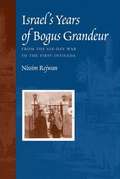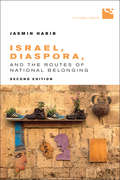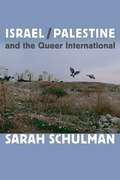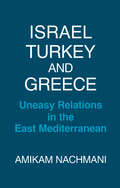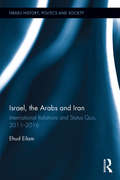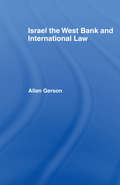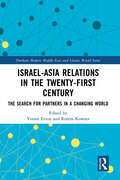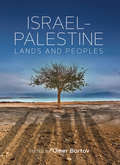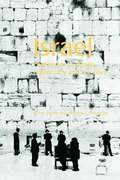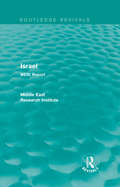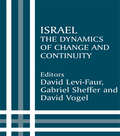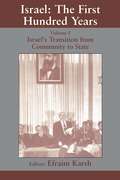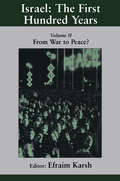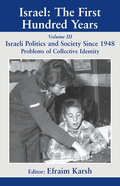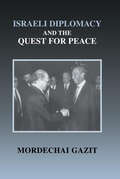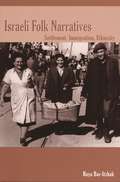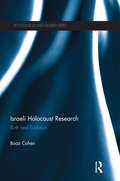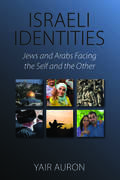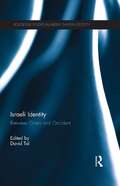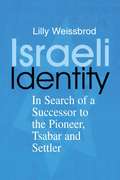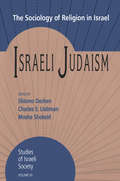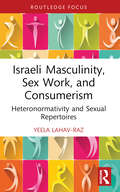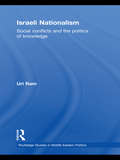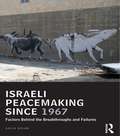- Table View
- List View
Israel's Years of Bogus Grandeur: From the Six-Day War to the First Intifada
by Nissim Rejwan foreword by Nancy E. BergOn the eve of the Six-Day War in 1967, Israel was nineteen years old and as much an adolescent as the average nineteen-year-old person. Issues of identity and transition were the talk among Israeli intellectuals, including the writer Nissim Rejwan. Was Israel a Jewish state or a democratic state? And, most frustratingly, who was a Jew? As Nancy Berg's foreword makes clear, these issues became more critical and complex in the two decades after the war as Israel matured into a regional power. Rejwan, an Iraqi-born Jew whose own fate was tied to the answers, addresses the questions of those days in his letters, essays, and remembrances collected in Israel's Years of Bogus Grandeur. Israel's overwhelming victory in 1967 brought control of the former Palestinian territories; at the same time, Oriental Jews (i. e. , those not from Europe) became a majority in the Israeli population. The nation, already surrounded by hostile, recently humiliated Arab neighbors, now had an Arab majority (Jewish, Muslim, Druze, and Christian) within its borders--yet European Jews continued to run the country as their own. Rejwan wrote tirelessly about the second-class status of Arab Israelis (and especially of Arab Jews), encouraging a more inclusive attitude that might eventually help heal the wounds left by the Six-Day War. His studies in sociology at Tel Aviv University informed his work. For his cause, Rejwan lost his job and many of his friends but never his pen. Through Munich, Entebbe, political scandals, economic crises, and the beginning of the Intifada, Rejwan narrates Israel's growing pains with feisty wit and unwavering honesty.
Israel, Diaspora, and the Routes of National Belonging, Second Edition (Cultural Spaces)
by Jasmin HabibOver the course of four years, Jasmin Habib was a participant observer on tours of Israel organized for diaspora Jews as well as at North American community events focusing on Israel and Israel-diaspora relations. In this book, she argues that much of the existing literature about North American Jews and their relationship to Israel ignores their reactions to official narratives and perpetuates an "official silence" surrounding the destructive aspects of nationalist sentiments. The second edition of Israel, Diaspora, and the Routes of National Belonging includes a new introduction by the author that builds on her groundbreaking research and reflects on the changes to scholarship since the book’s publication in 2004. Additionally, by exploring the dramatic changes to the region’s politics, Habib ensures that the startlingly honest, theoretically rich, and detailed analysis of her original work continues to be of relevance over a decade later.
Israel, Palestine and the Queer International
by Sarah SchulmanIn this chronicle of political awakening and queer solidarity, the activist and novelist Sarah Schulman describes her dawning consciousness of the Palestinian liberation struggle. Invited to Israel to give the keynote address at an LGBT studies conference at Tel Aviv University, Schulman declines, joining other artists and academics honoring the Palestinian call for an academic and cultural boycott of Israel. Anti-occupation activists in the United States, Canada, Israel, and Palestine come together to help organize an alternative solidarity visit for the American activist. Schulman takes us to an anarchist, vegan café in Tel Aviv, where she meets anti-occupation queer Israelis, and through border checkpoints into the West Bank, where queer Palestinian activists welcome her into their spaces for conversations that will change the course of her life. She describes the dusty roads through the West Bank, where Palestinians are cut off from water and subjected to endless restrictions while Israeli settler neighborhoods have full freedoms and resources.
Israel, Turkey and Greece: Uneasy Relations in the East Mediterranean
by Amikam NachmaniFirst Published in 1987. Routledge is an imprint of Taylor & Francis, an informa company.
Israel, the Arabs and Iran: International Relations and Status Quo, 2011-2016 (Israeli History, Politics and Society)
by Ehud EilamIsrael borders four states – Syria, Egypt, Jordan and Lebanon, and two entities – the Palestinian authority in the West Bank and Hamas in the Gaza stip. In recent years, despite incidents on the border with Syria and Egypt, the basic strategic status quo with these countries has not changed, and the overall balance of power between Israel and the Arabs has been maintained. Due to its military might, none of Israel's Arab neighbours are able to defeat it. Israel, however, for political, economic and military reasons, avoids enforcing its will and interfering in internal Arab matters and has successfully managed to stay out of the Arab turmoil. Israel, the Arabs and Iran gives a detailed overview of the various national security challenges that Israel has faced since 2011. It explains the key considerations and constraints Israel has had to deal with on several fronts, from its northern border with Lebanon to its southern border with Egypt. The book provides the reader with a deep understanding of why and how Israel has struggled to keep the status quo, whilst a large part of the Middle East remains in turmoil. The book is aimed at anyone studying Israel, its Foreign Policy, Middle Eastern Politics and International Relations. It will also appeal to government officials, military officers and anyone working or interested in national security issues concerning the Middle East and particularly Israel.
Israel, the West Bank and International Law
by Allan GersonSynthesizing primary and technical data, this book focuses on the legal and political aspects of Israeli administration in the West Bank and the international attempt to resolve the dispute over the territories. The author assesses the present situation and provides guidelines for future action.
Israel-Asia Relations in the Twenty-First Century: The Search for Partners in a Changing World (Durham Modern Middle East and Islamic World Series)
by Rotem Kowner Yoram EvronThis book examines Israel's growing interaction with Asia's sub-regions and countries since the 1990s. It shows how these interactions have increased in recent years, both at government level and for companies, entrepreneurs, academic institutions, religious groups, tourists, and NGOs. Likewise, it discusses the evolving shared interests between Israel and Asian states and demonstrates how Asian countries adopted sophisticated policies that allowed them to get closer to Israel without compromising their traditional support of the pro-Palestinian position. It also explores how Israel differentiates between different regions, circles of importance, and countries in Asia rather than sees Asia as a monolithic whole. This groundbreaking book concludes by assessing the overall state of relations at present and likely future developments.
Israel-Palestine: Lands and Peoples
by Omer BartovThe conflict between Israel and Palestine has raised a plethora of unanswered questions, generated seemingly irreconcilable narratives, and profoundly transformed the land’s physical and political geography. This volume seeks to provide a deeper understanding of the links between the region that is now known as Israel and Palestine and its peoples—both those that live there as well as those who relate to it as a mental, mythical, or religious landscape. Engaging the perspectives of a multidisciplinary, international group of scholars, it is an urgent collective reflection on the bonds between people and a place, whether real or imagined, tangible as its stones or ephemeral as the hopes and longings it evokes.
Israel-Palestine: Lands and Peoples
by Omer BartovThe conflict between Israel and Palestine has raised a plethora of unanswered questions, generated seemingly irreconcilable narratives, and profoundly transformed the land’s physical and political geography. This volume seeks to provide a deeper understanding of the links between the region that is now known as Israel and Palestine and its peoples—both those that live there as well as those who relate to it as a mental, mythical, or religious landscape. Engaging the perspectives of a multidisciplinary, international group of scholars, it is an urgent collective reflection on the bonds between people and a place, whether real or imagined, tangible as its stones or ephemeral as the hopes and longings it evokes.
Israel: Challenges to Identity, Democracy and the State (The Contemporary Middle East)
by Clive Jones Emma C. MurphyOften regarded as the only true manifestation of political pluralism in the contemporary Middle East, the state of Israel has dominated the history and politics of the region for over fifty years. Yet despite its position as a regional superpower, Israel continues to struggle with the whole issue of its own identity, the complexities of which have exposed deep clefts throughout Israeli society that threaten to undermine the collective ideal of a viable Jewish polity in the Middle East. The authors explore the complex challenges facing Israel, and the extent to which its present state structures and institutions can adapt and accommodate themselves to the diversity of security threats that it now faces. This book will be of interest to those who wish to understand the dynamics that have shaped and continue to shape the state of Israel, and the extent to which these have influenced its search for security in the modern Middle East.
Israel: MERI Report (Routledge Revivals: Middle East Research Institute Reports)
by Middle East Research InstituteFirst published in 1985, this study, focusing on Israel, looks at the underlying reasons why certain political, economic and social events have taken place in the country’s history. It provides vital analysis of the political and economic issues of the country, and those that have affected it, as well as providing statistical material on all the key data of the political economy.The book was originally published as part of the Middle East Research Institute (MERI) Reports on the Middle East which quickly established themselves as the most authoritative and up-to-date information on the state of affairs in the region.
Israel: The Dynamics of Change and Continuity (Israeli History, Politics and Society #4530)
by David Vogel Gabriel Sheffer David Levi-FaurThese essays examine changes in Israel's political, social and economic institutions, and describe how Israeli culture and institutions are resisting convergence. They are in four categories: political institutions and organizations; political economy; ethnicity and religion; and public policy.
Israel: Volume I: Israel’s Transition from Community to State (Israeli History, Politics and Society #Vol. 2)
by Efraim KarshThe Zionist Movement was born in the wake of Jewish emancipation in Western Europe, and at a time of increased persecution in Eastern Europe. This volume addresses the intellectual, social and political ramifications of Jewish settlement in Eretz Israel before the creation of the State of Israel.
Israel: Volume II: From War to Peace? (Israeli History, Politics and Society #Vol. 2)
by Efraim KarshThe end of the British mandate in Palestine heralded the birth of the new state of Israel. It also marked the end of one of the most tumultuous and momentous chapters in Israeli history. But the new state, born into a hostile environment and struggling with the manifold demands of sovereignty, would have to face many post-Independence challenges to its existence, not least in the form of armed conflict and confrontation with its Arab neighbours. This volume examines the conflicts that from the 1948 until the 1967 Six Day War came to define the Israeli struggle for existence.
Israel: Volume III: Politics and Society since 1948 (Israeli History, Politics and Society #Vol. 2)
by Efraim KarshSince its founding in 1948 Israel has faced many political, social and psychological challenges, unfamiliar to other nations on the western democratic political model and peculiar to the Jewish state. This work covers the role of politics in Israel since 1948.
Israeli Diplomacy and the Quest for Peace (Israeli History, Politics and Society)
by Mordechai GazitThis account of key issues in Israel's foreign policy offers a new insight into Israeli thinking. It also covers issues where the focus is on American, British, Egyptian and Jordanian diplomacy. The author's research is based on an abundance of documentary evidence, and the analysis benefits from his unique background as a senior diplomat for over 30 years and from his academic experience of over two decades.
Israeli Folk Narratives: Settlement, Immigration, Ethnicity
by Haya Bar-ItzhakThe goals and challenges that face the people of Israel are vividly illustrated by the country's many folk stories. Here Haya Bar-Itzhak presents these tales--gathered from the early settlers of the kibbutz, from immigrants who arrived in Israel after independence, and from ethnic groups--to create a panoramic view of a fascinatingly complex society. Creating stories set in the past, even the recent past, is a way for societies to express their problems, adversities, yearnings, and hopes. Bar-Itzhak finds this true among inhabitants of the kibbutz, who find their society at a crossroads as a result of changes in Israeli society at large. She reveals the symbolic dimensions of their stories--some dealing with the death of young soldiers (sacrificed sons) in battle--as pointing to the complexity of a local culture that expresses the ethos of Labor Zionism. In a section dealing with the folklore of immigrants, Bar-Itzhak focuses on the narratives of Yemenite Jews and Polish Jews. Their stories express their traumatic meeting with Israeli society while providing a means for coming to grips with it. The final section, dealing with ethnic folklore of Moroccan Jews, explores the wonder tale through the perspective of disabled and elderly storytellers, who in the language of their community seek to defend their own values and norms, and examines the saints' legends and the body language usually employed in the telling of them. Throughout, the author illuminates the unique challenge of experiencing ethnicity as Jews vis-à-vis other Jews. Israeli Folk Narratives combines new data with insightful analyses. Anyone interested in folk stories and Israeli culture will be enlightened by this sensitive, thought-provoking book.
Israeli Holocaust Research: Birth and Evolution (Routledge Jewish Studies Series)
by Boaz CohenAn exploration of the development of Holocaust research in Israel, this book ranges from the consolidation of Holocaust research as an academic subject in the late 1940s to the establishment of Yad Vashem and beyond. Research on the story of historiography is often a work on books, on the "final products" that fill academic bookshelves yet, in Israeli Holocaust Research, Boaz Cohen illustrates that the evolution of holocaust research in Israel has a more human element to it. Drawing on knowledge gained through seven years of work in ten major archives in Israel, the author reveals a previously unseen picture of the development of Israeli Holocaust research "from below," and of the social and cultural forces influencing its character. In doing so, a new facet to the picture emerges, of the story beyond the archive and the people who see Holocaust research as their mission and responsibility. This book will be a fascinating addition to the study of Holocaust research and will be of particular interest to students of history, historiography and Jewish studies
Israeli Identities: Jews and Arabs Facing the Self and the Other
by Yair AuronThe question of identity is one of present-day Israel's cardinal and most pressing issues. In a comprehensive examination of the identity issue, this study focuses on attitudes toward the Jewish people in Israel and the Diaspora; the Holocaust and its repercussions on identity; attitudes toward the state of Israel and Zionism; and attitudes toward Jewish religion. <p><p> Israeli Arab students (Israeli Palestinians) and Jewish Israeli students were asked corresponding questions regarding their identity. It was found that, rather than lessening its impact over the years, the Holocaust has become a major factor, at times the paramount factor in Jewish identity. Similarly, among Palestinians the Naqba has become a major factor in Palestinian-Israeli identity. <p> However, the overall results show that the identity of a Jewish citizen of Israel is not purely Israeli, nor is it purely Jewish. It is, to varying degrees, a synthesis of Jewish and Israeli components, depending on the particular sub-groups or sub-identities. The same holds for Israeli-Arabs or Israeli-Palestinians who have neither a purely Israeli identity nor a purely Palestinian (or Arab) one.
Israeli Identity: Between Orient and Occident (Routledge Studies in Middle Eastern Society)
by David TalFor many years before and after the establishment of the state of Israel, the belief that Israel is a western state remained unchallenged. This belief was founded on the predominantly western composition of the pre-statehood Jewish community known as the Yishuv. The relatively homogenous membership of Israeli/Jewish society as it then existed was soon altered with the arrival of hundreds of thousands of Jewish immigrants from Middle Eastern countries during the early years of statehood. Seeking to retain the western character of the Jewish state, the Israeli government initiated a massive acculturation project aimed at westernizing the newcomers. More recently, scholars and intellectuals began to question the validity and logic of that campaign. With the emergence of new forms of identity, or identities, two central questions emerged: to what extent can we accept the ways in which people define themselves? And on a more fundamental level, what weight should we give to the ways in which people define themselves? This book suggests ways of tackling these questions and provides varying perspectives on identity, put forward by scholars interested in the changing nature of Israeli identity. Their observations and conclusions are not exclusive, but inclusive, suggesting that there cannot be one single Israeli identity, but several. Tackling the issue of identity, this multidisciplinary approach is an important contribution to existing literature and will be invaluable for scholars and students interested in cultural studies, Israel, and the wider Middle East.
Israeli Identity: In Search of a Successor to the Pioneer, Tsabar and Settler (Israeli History, Politics and Society #Vol. 18)
by Lilly WeissbrodThis thoroughly researched book reveals the true identity of the modern Israeli. Israelis are unique in having changed their identity three times in only one hundred years. Written in a user-friendly style, the book will appeal to scholars and students of the Middle East.
Israeli Judaism: The Sociology of Religion in Israel (Studies Of Israeli Society Ser. #Vol. 7)
by Moshe Shokeid Shlomo Deshen Charles S. LiebmanThis is an unusual and extremely timely collective effort. It appears at a moment in which Israelis not only must confront their Arab neighbors, but must deal with one another as Jews possessing radically different views on the present and future of the Jewish tradition. With this seventh volume of the series, the Israeli Sociological Society has turned its attention to religion, an area that for many years has been of high importance, but low profile in Israeli affairs and in the wider Middle Eastern context. Chapters and contributors include: "Jewish Civilization: Approaches to Problems of Israeli Society" by Shmuel N. Eisenstadt; "Life Tradition and Book Tradition in the Development of Ultraorthodox Judaism" by Menachem Friedman; "Religious Kibbutzim: Judaism and Modernization" by Aryei Fishman; "The Religion of Elderly Oriental Jewish Women" by Susan Sered; and "Hanukkah and the Myth of the Maccabees in Ideology and in Society" by Eliezer Don-Yehiya. The increasing presence of religious activism in contemporary Israel, side by side with subtle changes in the religion of Israeli Sephardim, makes the topic of religion essential for an understanding of Israel—and much of the Middle East generally. Israeli Judaism is a significant work, and will be of interest to theologians, philosophers, sociologists, anthropologists, and political theorists.
Israeli Masculinity, Sex Work, and Consumerism: Heteronormativity and Sexual Repertoires (Focus on Global Gender and Sexuality)
by Yeela Lahav-RazIsraeli Masculinity, Sex Work, and Consumerism: Heteronormativity and Sexual Repertoires explores the inner world of Israeli sex work consumers and their use of digital technologies on which intense feelings of social togetherness and belonging create a localized form of homosociality and brotherhood. The first of its kind to offer an in-depth analysis of masculine sexual repertoires in the field of sex consumption, this book uses extensive data and observations of online ethnography among a community of Israeli sex consumers operating online. It elucidates the economics of demand in the field of sexual consumption and highlights how the rise of the thriving online communities of sex consumers can function as a platform on which power relations between men themselves are publicly displayed and are constantly challenged. Israeli Masculinity, Sex Work, and Consumerism: Heteronormativity and Sexual Repertoires will be suitable for researchers in Gender and Sexuality Studies, Sociology, Anthropology and Criminology.
Israeli Nationalism: Social conflicts and the politics of knowledge (Routledge Studies in Middle Eastern Politics)
by Uri RamThe question of nationalism centres around the political, social, and cultural ways by which the concept and practice of a nation is constructed, and what it means to its various bearers. This book examines the issue of Jewish-Israeli nationalism, combining a sociological study of national culture with a detailed analysis of Israeli national discourse. Taking an interdisciplinary approach, the author explores the categories of thought that constitute the Jewish-Israeli "nation" as an historical entity, as a social reality and as a communal identity. Unravelling the ways in which Israeli nationhood, society and identity had been assumed as immutable, monolithic and closely bound objects by Zionist ideology and scholarship, he then explores how in modern times such approaches have become subject to an array of critical discourses, both in the academic disciplines of history, sociology and cultural studies, and also in the wider sphere of Israeli identity discourse. This unique study of the issue of Jewish-Israeli nationalism will be of great interest to students and scholars of Israeli Studies, Middle East Studies and Jewish History, as well as those working in the fields of Sociology, Political Science, History and Cultural Studies with an interest in nationalism, citizenship, social theory and historiography.
Israeli Peacemaking Since 1967: Factors Behind the Breakthroughs and Failures (UCLA Center for Middle East Development (CMED) series)
by Galia GolanExamining the Israeli-Arab conflict as an "intractable conflict," Israeli Peacemaking since 1967 seeks to determine just which factors, or combination of factors, impacted on Israel's position in past peace-making efforts, possibly accounting for breakthroughs or failures to reach agreement. From King Hussein's little known overtures immediately after the Six-Day War, through President Sadat's futile efforts to avoid war in the early 1970s, to repeated third-party-mediated talks with Syria, factors including deep-seated mistrust, leadership style, and domestic political spoilers contributed to failures even as public opinion and international circumstances may have been favourable. How these and other factors intervened, changed or were handled, allowing for the few breakthroughs (with Egypt and Jordan) or the near breakthrough of the Annapolis process with the Palestinians, provides not only an understanding of the past but possible keys for future Israeli-Arab peace efforts. Employing extensive use of archival material, as well as interviews and thorough research of available sources, this book provides insight on just which factors, or combination of factors, account for breakthroughs or failures to reach agreement; a framework useful for examining both the Israeli-Arab conflict and intractable conflicts in general.
